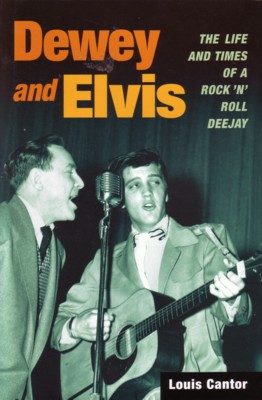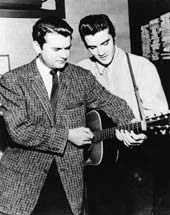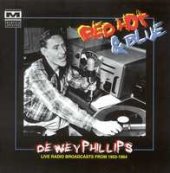
Quote:
"Elvis Presley is the greatest cultural force in the 20th century."
(Leonard Bernstein)
Quote:
"If you're an Elvis fan, no explanation is necessary; If you're not an Elvis fan, no explanation is possible."
(George Klein)
Quote:
"For a dead man, Elvis Presley is awfully noisy."
(Professor Gilbert B. Rodman)
Quote:
"History has him as this good old country boy, Elvis is about as country as Bono!"
(Jerry Schilling)
Quote:
"Absolute id crashed into absolute superego...as the uptightset man in America shook hands with just about the loosest."
(Mark Feeney on the 'Elvis meets Nixon' meeting)
Quote:
"Elvis is everywhere"
(Mojo Nixon & Skid Roper)
Quote:
"...especially in the South, they talk about Elvis and Jesus in the same breath"
(Michael Ventura, LA Weekly)
|
|
Dewey and Elvis: The Life and Times of A Rock 'n' Roll Deejay
|
by Louis Cantor
University of Illinois Press, USA, 2005, Hardcover (with dust jacket) , ISBN: 025202981X
"Oh yessuh, good people, this is ol' Daddy-O-Dewey comin' atcha for the next three hours with the hottest cotton-pickin' records in town..."
Who was more important in the early career of Elvis - Sam Phillips or Dewey Phillips? I suspect many will answer Sam Phillips, but Professor Louis Cantor's extraordinary biography on Dewey Phillips is likely to change many minds, as it did mine.
While others have written about the importance of the other "Phillips", Sam (Dewey and Sam weren't related), in the early success of Elvis' career, little has been written, until now, about the arguably more important influence of Dewey Phillips, the eccentric, southern deejay with a 'machine gun' rapid mouth.
You cannot help but be enthralled by the larger than life story of Dewey Phillips - its spirit, pleasure, its pain, its pathos. Dewey's story is rich in detail, rich in substance and rich in color.
From his unique style and eccentric studio behaviour to his womanising and eventual self-destruction in a body tormented by physical pain only partially placated by pills and booze, Dewey Phillips' life is a riveting one. |
 |
"Dewey and Elvis" is actually three stories in one - it is a multi-layered account of three men at the center of the rise of a youth culture based around rising affluence and a radically new musical form. At its center, Louis Cantor has profiled a person whose pivotal role in the rise of not only Elvis, but also rock 'n' roll in general, has been generally understated.
This is a book which adds real value to our understanding of the Elvis story, and just as importantly of how gutsy rock 'n' roll music replaced a staid, whitebread music culture.
Professor Cantor has written a scholarly yet very accessible narrative. It resonates as a vibrant tapestry full of humor, color, life and human frailty. Within the first 20 pages I had tears running down my cheeks. The hilarious accounts of Dewey's studio exploits have to be read to be believed.
A central theme in "Dewey and Elvis" is that Red, Hot & Blue was not only the first radio program to play That's All Right, Mama in its entirety, it was also the conduit for legitimising rock 'n' roll music.
Why it, and Dewey Phillips, are so important to popular music is captured in this passage:
Even if Dewey had no social or political agenda he still shook up the racial status quo. He was able to do so only because his showmanship and infectious behavior on Red, Hot and Blue made blacks as well as whites captive to his charms. Change occurred only because his outlaw style made him irresistable to listeners. Dewey alone achieved huge success in crossing all musical barriers of race because he was what might be called unavoidably entertaining. His seductive personality allowed him to revolutionize and integrate the airways without so much as an ounce of resistance. He was turned on to the music, his audience was turned on to him, and the rest is nothing short of a cultural revolution.
| Readers may be surprised to find out how important Dewey was to his great friend, Sam Phillips. Dewey's ear for what would be a hit was a major tool used by Sam to gauge how many copies to press of a new record. |
 |
One of the book's most perceptive and poignant moments belongs to Dewey's widow, Dot*:
On this particular evening in Sam's backyard, everyone, including Elvis, seemed to be in a particularly pensive mood. Whenever the crowd got together - especially Dewey and Sam - there was always "lots of hollering and carrying on," but this night seemed different. The evening had started late, and after a while "things just seemed to quiet down and everybody got kind of comfortable in their favorite chairs." Before anyone realized it, the first light of an Easter sunrise began to break. At that point Elvis, without provocation or request, ambled over to his guitar and started strumming slowly. "Just as the sun was coming up, he began singing 'Take My Hand, Precious Lord,' Dot says as she stares outward, apparently seeing the picture now as vividly as then." And I think it was the most beautiful moment I can remember in my whole life."
Elsewhere, Cantor, like Guralnick before him, questions how often Elvis frequented the rich musical culture of Beale Street, suggesting the usually published account lacks proof.
The rigor employed by Cantor in forging an abundant and learned biography is impressive. "Elvis and Dewey" gains much of its strength from the many primary source materials researched, and the more than 60 interviews conducted during the writing of the book. These elements are nicely complemented by the author's personal perspective on the events he is writing about. |
 |
Verdict: Historically, the importance of Dewey Phillips in the Elvis story has not been well chronicled. Louis Cantor has rectified this surprising gap in popular music history. "Elvis and Dewey" is to date clearly the best Elvis book of 2005 and one of the best of all-time. It is a vibrantly colorful and engaging story that will make you laugh and make you cry. It is perfect for a big screen adaptation. Highly recommended.
* Sadly, Dot Phillips passed away in mid 2005.
|
Quote:
"Elvis Presley is the supreme socio-cultural icon in the history of pop culture"
(Dr. Garry Enders)
Quote:
" Elvis is the 'glue' which holds our society together....which subconciously gives our world meaning"
(Anonymous)
Quote:
"Eventually everybody has to die, except Elvis"
(humorist Dave Barry)
Quote:
"He is the "Big Bang", and the universe he detonated is still expanding, the pieces are still flying"
(Greil Marcus, "Dead Elvis")
Quote:
"I think Elvis Presley will never be solved"
(Nick Tosches)
|


